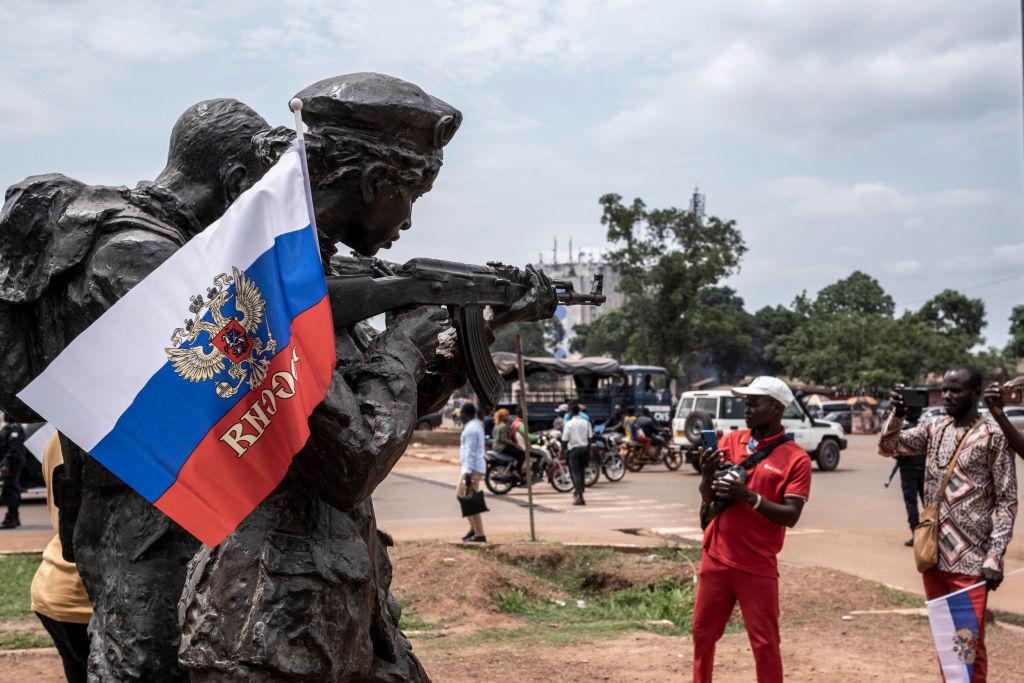Russian authorities recently demanded that the Central African Republic (CAR) end its yearslong relationship with the Wagner Group and replace those mercenaries with the state-run Africa Corps, a deal that includes building a Russian military base in the country.
The demand is the latest demonstration of Russia’s ongoing campaign to exert political and military influence across multiple African countries while also extracting valuable minerals, oil and other resources for its own benefit — all while declaring that Russia is different from the European countries that colonized Africa.
“Russia’s anti-colonial crusade belies its efforts to advance its own political and economic interests,” Rand Corp. analyst Benjamin R. Young wrote in Foreign Policy.
Chief among those political and economic interests is undercutting international sanctions imposed on Russia after the 2014 annexation of Crimea and the 2022 invasion of Ukraine.
“The invasion of Ukraine and the failure to achieve a quick victory has accentuated this dual dependence between Russia and Africa,” analyst Ignacio Fuente Cobo wrote for the Spanish Institute for Strategic Studies. “This has forced it to strengthen its policy of reducing its own vulnerability to sanctions by controlling critical resources in Africa.”
To that end, Russia has used propaganda to stir public sentiment against France and other European countries with ties to Africa while offering itself as an alternative.
It focused much of its attention on the Sahel, where Burkina Faso, Mali and Niger all experienced military coups motivated in part by Russian propaganda. But it also has put new pressure on countries such as the CAR, where it has a foothold courtesy of the Wagner Group and its affiliated mining operations.
Earlier this year, Russia replaced Wagner Group mercenaries with Africa Corps forces in Mali. The change was largely a rebranding, since the majority of Africa Corps fighters came from Wagner.
Under its agreement with Wagner, Mali paid the organization $10 million a month by granting it permission to mine gold and other resources. Much of that revenue flowed directly back to Moscow through illicit means to fund the Ukraine invasion.
While it is unclear how Mali will pay for Africa Corps, there are some economic arrangements such as that of the Russian conglomerate Yadran Group, which has a minority stake in a new gold refinery under construction in the country..
Russia has built a similar relationship with the junta ruling Burkina Faso, providing military assistance in exchange for mining concessions.
In Niger, Russia is working to take control of uranium mining while also deploying Africa Corps troops as military trainers. Russia’s state atomic energy corporation Rosatom has signed agreements with at least 20 African countries that will make them dependent on Russian technology going forward, according to analysts.
After nearly a decade in the CAR, Wagner mercenaries have become deeply integrated into the government, performing everything from presidential security to customs enforcement. They have joined CAR Soldiers in fighting rebel groups and are paid for their presence through the mining of diamonds and other minerals. They even run a brewery and a pro-Russian radio station in the capital, Bangui.
“Vladimir Putin’s regime has achieved an unmatched level of influence in the country’s affairs,” Alvaro Piaggio and Mohamed Keita wrote for the Human Rights Foundation. “But Russian activities in the country have exacerbated long-running lawlessness, corruption, violence, and human rights abuses with total impunity.”
Along with demanding that CAR switch to Africa Corps, Russian authorities also have demanded cash payments to support the operation, payments that could reach millions of dollars a year.
CAR officials have told the Russians they don’t have that kind of money and have offered to continue to pay through the mining of gold, uranium and iron, according to The Associated Press.
Russia’s operations in countries such as Burkina Faso, CAR, Mali and Niger represent an escalation of Russian President Vladimir Putin’s plans for the continent, according to analyst Solomon Ekanem.
“The Putin effect, therefore, is less about retreat and more about recalibration: tightening the reins, institutionalizing power, and embedding long-term influence in African security and resource politics,” Ekanem wrote recent for Business Insider.

